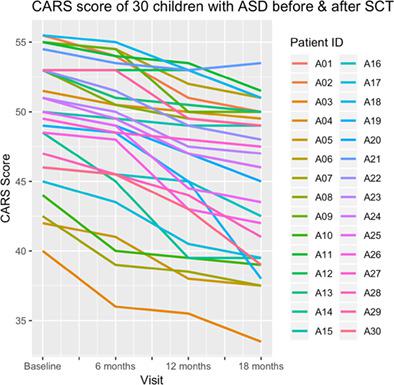当前位置:
X-MOL 学术
›
Stem Cells Transl. Med.
›
论文详情
Our official English website, www.x-mol.net, welcomes your feedback! (Note: you will need to create a separate account there.)
Outcomes of bone marrow mononuclear cell transplantation combined with interventional education for autism spectrum disorder.
STEM CELLS Translational Medicine ( IF 6 ) Pub Date : 2020-09-09 , DOI: 10.1002/sctm.20-0102 Liem Nguyen Thanh 1 , Hoang-Phuong Nguyen 1 , Minh Duy Ngo 2 , Viet Anh Bui 3 , Phuong T M Dam 3 , Hoa Thi Phuong Bui 3 , Doan Van Ngo 2 , Kien Trung Tran 1 , Tung Thi Thanh Dang 2 , Binh Duc Duong 2 , Phuong Anh Thi Nguyen 2 , Nicholas Forsyth 4 , Michael Heke 5
STEM CELLS Translational Medicine ( IF 6 ) Pub Date : 2020-09-09 , DOI: 10.1002/sctm.20-0102 Liem Nguyen Thanh 1 , Hoang-Phuong Nguyen 1 , Minh Duy Ngo 2 , Viet Anh Bui 3 , Phuong T M Dam 3 , Hoa Thi Phuong Bui 3 , Doan Van Ngo 2 , Kien Trung Tran 1 , Tung Thi Thanh Dang 2 , Binh Duc Duong 2 , Phuong Anh Thi Nguyen 2 , Nicholas Forsyth 4 , Michael Heke 5
Affiliation

|
The aim of this study was to evaluate the safety and efficacy of autologous bone marrow mononuclear cell transplantation combined with educational intervention for children with autism spectrum disorder. An open‐label clinical trial was performed from July 2017 to August 2019 at Vinmec International Hospital, Hanoi, Vietnam. Thirty children who fulfilled the autism criteria of the Diagnostic and Statistical Manual of Mental Disorders, Fifth Edition, and had Childhood Autism Rating Scale (CARS) scores >37 were selected. Bone marrow was harvested by anterior iliac crest puncture under general anesthesia. The volume collected was as follows: 8 mL/kg for patients under 10 kg (80 mL + [body weight in kg − 10] × 7 mL) for patients above 10 kg. Mononuclear cells were isolated with a Ficoll gradient and then infused intrathecally. The same procedure was repeated 6 months later. After the first transplantation, all patients underwent 8 weeks of educational intervention based on the Early Start Denver Model. There were no severe adverse events associated with transplantation. The severity of autism spectrum disorder (ASD) was significantly reduced, with the median CARS score decreasing from 50 (range 40‐55.5) to 46.5 (range 33.5‐53.5) (P < .05). Adaptive capacity increased, with the median Vineland Adaptive Behavior Scales score rising from 53.5 to 60.5. Social communication, language, and daily skills improved markedly within 18 months after transplantation. Conversely, repetitive behaviors and hyperactivity decreased remarkably. Autologous bone marrow mononuclear cell transplantation in combination with behavioral intervention was safe and well tolerated in children with ASD (Trial registration: ClinicalTrials.gov identifier: NCT03225651).
中文翻译:

骨髓单个核细胞移植联合干预教育治疗孤独症谱系障碍的效果。
本研究旨在评估自体骨髓单个核细胞移植联合教育干预对自闭症谱系障碍儿童的安全性和有效性。2017 年 7 月至 2019 年 8 月在越南河内的 Vinmec 国际医院进行了一项开放标签临床试验。选择了 30 名符合《精神疾病诊断和统计手册》第五版的自闭症标准且儿童自闭症评定量表 (CARS) 得分 > 37 的儿童。在全身麻醉下通过髂前嵴穿刺采集骨髓。收集的体积如下:10 kg 以下患者为 8 mL/kg(80 mL + [体重 kg - 10] × 7 mL),10 kg 以上患者。用 Ficoll 梯度分离单核细胞,然后鞘内注入。6个月后重复相同的程序。在第一次移植后,所有患者都接受了基于 Early Start Denver 模型的 8 周教育干预。没有与移植相关的严重不良事件。自闭症谱系障碍(ASD)的严重程度显着降低,CARS 评分中位数从 50(范围 40-55.5)降至 46.5(范围 33.5-53.5)(P < .05)。适应能力增加,Vineland 适应行为量表得分中位数从 53.5 上升到 60.5。移植后 18 个月内社交沟通、语言和日常技能显着提高。相反,重复行为和多动显着减少。自体骨髓单个核细胞移植联合行为干预在 ASD 儿童中是安全且耐受性良好的(试验注册:ClinicalTrials.gov 标识符:NCT03225651)。
更新日期:2020-09-09
中文翻译:

骨髓单个核细胞移植联合干预教育治疗孤独症谱系障碍的效果。
本研究旨在评估自体骨髓单个核细胞移植联合教育干预对自闭症谱系障碍儿童的安全性和有效性。2017 年 7 月至 2019 年 8 月在越南河内的 Vinmec 国际医院进行了一项开放标签临床试验。选择了 30 名符合《精神疾病诊断和统计手册》第五版的自闭症标准且儿童自闭症评定量表 (CARS) 得分 > 37 的儿童。在全身麻醉下通过髂前嵴穿刺采集骨髓。收集的体积如下:10 kg 以下患者为 8 mL/kg(80 mL + [体重 kg - 10] × 7 mL),10 kg 以上患者。用 Ficoll 梯度分离单核细胞,然后鞘内注入。6个月后重复相同的程序。在第一次移植后,所有患者都接受了基于 Early Start Denver 模型的 8 周教育干预。没有与移植相关的严重不良事件。自闭症谱系障碍(ASD)的严重程度显着降低,CARS 评分中位数从 50(范围 40-55.5)降至 46.5(范围 33.5-53.5)(P < .05)。适应能力增加,Vineland 适应行为量表得分中位数从 53.5 上升到 60.5。移植后 18 个月内社交沟通、语言和日常技能显着提高。相反,重复行为和多动显着减少。自体骨髓单个核细胞移植联合行为干预在 ASD 儿童中是安全且耐受性良好的(试验注册:ClinicalTrials.gov 标识符:NCT03225651)。


























 京公网安备 11010802027423号
京公网安备 11010802027423号